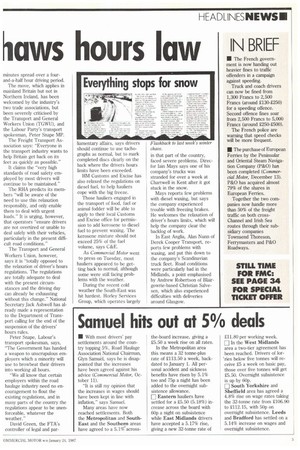Big freeze haws hours law
Page 6

Page 7

If you've noticed an error in this article please click here to report it so we can fix it.
• Hauliers faced with a massive backlog of work caused by last week's big freeze can at least draw some comfort from the Department of Transport's decision to suspend driver's hours rules for 30 days.
The temporary relaxation of EC regulations 3820/85, which covers drivers' hours, began on Saturday, January 17, and is expected to run until February 15, although the Department of Transport has the right to reimpose the drivers hours rules before then.
Drivers are still limited to a maximum continuous driving period of four-and-a-half hours, after which they must take a break of at least 45 minutes. They may alternatively take shorter breaks of at least 15 minutes spread over a fourand-a-half hour driving period.
The move, which applies in mainland Britain but not in Northern Ireland, has been welcomed by the industry's two trade associations, but been severely criticised by the Transport and General Workers Union (TGWU), and the Labour Party's transport spokesman, Peter Snape MR The Freight Transport Association says: "Everyone in the transport industry wants to help Britain get back on its feet as quickly as possible."
It claims the "very high standards of road safety employed by most drivers will continue to be maintained."
The RHA predicts its members "will be aware of the need to use this relaxation responsibly, and only enable them to deal with urgent loads." It is urging, however, that operators "ensure drivers are not overtired or unable to deal safely with their vehicles, particularly in the present difficult road conditions."
The Transport and General Workers Union, however, says it is "totally opposed to the relaxation of driver's hours regulations. The regulations are totally adequate to deal with the present circumstances and the driving day can already be exhausting without this change." National Secretary Jack Ashwell has already made a representation to the Department of Transport calling for the end of the suspension of the drivers' hours rules.
Peter Snape, Labour's transport spokesman, says, "The Government has handed a weapon to unscrupulous employers which a minority will use to browbeat their drivers into working all hours.
"We all know that certain employers within the road haulage industry need no encouragement to flout the existing regulations, and in many parts of the country the regulations appear to be unenforceable, whatever the weather."
David Green, the PTA's controller of legal and par
liamentary affairs, says drivers should continue to use tachographs as normal, but to mark completed discs clearly on the back where the drivers hours limits have been exceeded.
HM Customs and Excise has also relaxed the regulations on diesel fuel, to help hauliers cope with the big freeze.
Those hauliers engaged in the transport of food, fuel or animal fodder will be able to apply to their local Customs and Excise office for permission to add kerosene to diesel fuel to prevent waxing. The kerosene mixture should not exceed 25% of the fuel volume, says C&E.
As Commercial Motor went to press on Tuesday, most hauliers appeared to be getling back to normal, although some were still facing problems with the weather.
During the recent cold weather the South-East was hit hardest. Horley Services Group, which operates largely in that part of the country, faced severe problems. Direcfor lain Mays says one of his company's trucks was stranded for over a week at Chartwell in Kent after it got stuck in the snow.
Mays reports few problems with diesel waxing, but says the company experienced trouble with freezing brakes. He welcomes the relaxation of driver's hours limits, which will help the company clear the backlog of work.
In East Anglia, Alan Nunn of Derek Cooper Transport, reports few problems with waxing, and put this down to the company's Scandinavian truck fleet. Road conditions were particularly bad in the Midlands, a point emphasised by Andrew Robertson of Blairgowrie-based Christian Salvesen, which also experienced difficulties with deliveries around Glasgow.








































































































